Fire laboratory
We perform fire tests
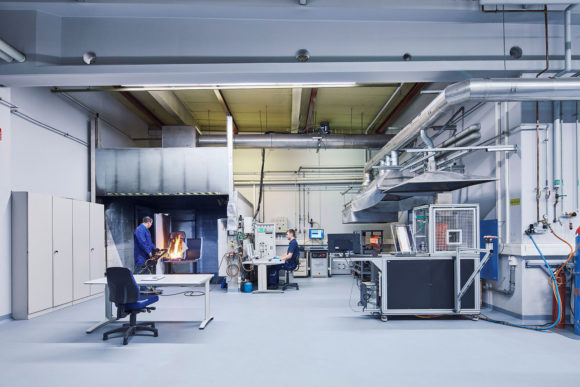
RST subjects your product to the required fire tests. In our DIN EN ISO / IEC 17025:2018 accredited fire laboratory, we test your development samples, prototypes and series products according to national and international standards and regulations. In FIRST tests, we test your vehicle components and materials for flammability, heat resistance, flame spread, fire behaviour, heat release, smoke gas development and smoke gas toxicity.
100+ standards
covered
Fast
and reliable
Customised
for your scenario
Qualitative
and accredited
Wide range of test methods
We carry out fire tests on building materials, small parts and component sections for rail vehicles, automobiles, ships and for the construction and electrical industries. Our extensive testing equipment enables us to carry out fire tests on seats, on materials for vehicle interiors and on building materials. We also test furniture, bedding and other textiles for flammability. We also determine toxic gasses and test the smoke development of plastics.
It is important to understand how materials, products or systems behave in real fires compared to controlled fire tests. Improved behaviour when exposed to fire can be demonstrated in a number of ways, such as longer ignition duration, reduced heat release, reduced flame spread or reduced smoke and toxicity development.
Flame spread
We test flame propagation on test specimens with and without heat emitters. For classification, the flame front is determined as the boundary of the flame zone on the surface of a material.
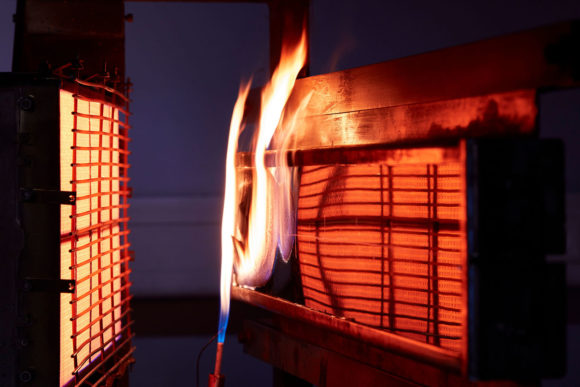
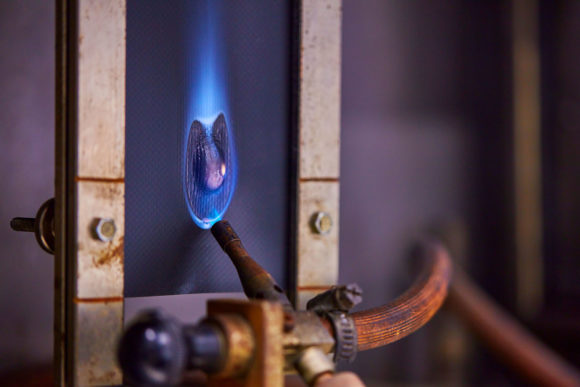
Flammability
We check how easily your product ignites or burns when exposed to a flame or heat.
Heat release rate
Using a cone and bomb calorimeter, we determine the heat energy released during combustion of the test specimen.
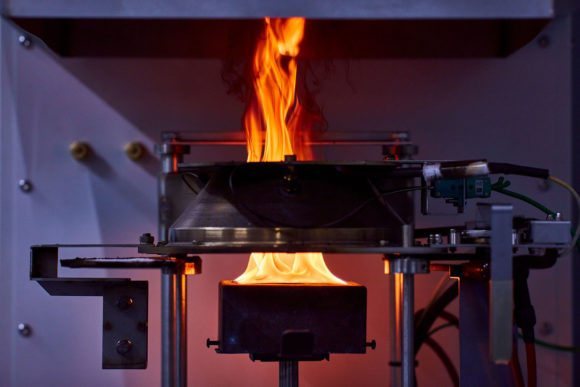
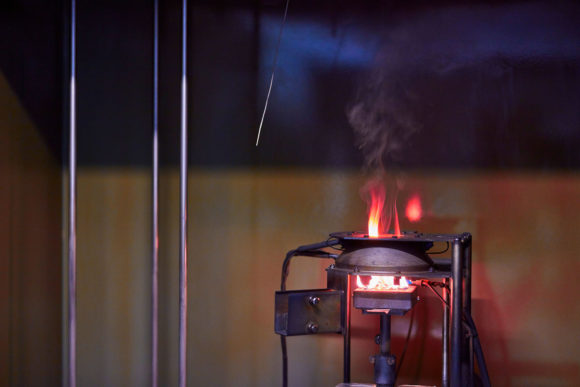
Smoke development
Fire is a complex phenomenon. How it develops and acts depends on a variety of factors. To assess the risk of fire, smoke is almost always considered as one of the first reaction characteristics indicating a fire. After all, in the event of a fire, smoke is one of the greatest hazards to people in burning buildings or enclosures, e.g. ships or trains.
Toxicity
Under controlled conditions, we determine the smoke density and toxicity potential of the fire gasses during combustion. In the process, representative conditions are produced for fires that may affect the component during fire development or during a fully developed fire. In the course of the toxicity test, flue gas samples are continuously taken from the test chamber for FTIR analysis. In accordance with the applicable standards, the tests are carried out at a fixed irradiance.
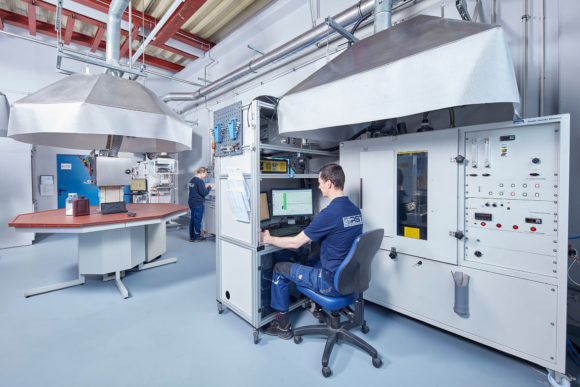
Exactly what you need.
RST is your competent partner, no matter which project you are in charge of and which test you need.
Purchasing
Our optimised processes guarantee you fast and smooth processing of your order without long waiting times. Your request is our top priority. Our wealth of experience is based on countless test orders successfully completed for a wide range of customers.
Project management
With our technical support, we are always at your side - even in the event of unexpected changes to the planned test sequence, necessary rework and adjustments to the test specimen, as well as under deadline. During the ongoing test, you can rely on optimal communication with our testers and engineers. We always keep you up to date and contact you immediately in case of problems or damage to the test object. You are welcome to accompany your tests personally on site or via video transmission.
Quality management
RST is available to you as an accredited laboratory. Our competent and experienced test staff, equipped with comprehensive knowledge of standards and test requirements, are prepared for any challenge. Within the framework of our flexible accreditation, we develop individual test procedures for you outside of the standard specifications and are available to advise you the entire time. We deliver high-quality test reports in German and English.
The standard you are looking for?
We test for you!
STANDARD SEARCH
For testing of materials and components in railway vehicles
| DIN 5510-2 2009-05 | Preventive fire protection in railway vehicles – Part 2: Fire behaviour and fire side effects of materials and parts – Classification, requirements and test methods Testing of seats in railways for public transportation Annex C: Determining the toxicity of fire effluents |
| DIN EN 45545-2 2016-02 | Railway applications – Fire protection on railway vehicles – Part 2: Requirements for fire behaviour of materials and components Annex B: Fire test method for seating Annex C: Testing methods for determination of toxic gases from railway products |
DIN EN 45545-2 2020-10 | Railway applications – Fire protection on railway vehicles – Part 2: Requirements for fire behavior of materials and components |
DIN EN 16989 2018-08 | Railway applications – Fire protection on railway vehicles – Fire behaviour test for a complete seat |
| DIN EN 17084 2020-10 | Railway applications – Fire protection on railway vehicles – Toxicity test of materials and components |
| DIN 54341 1988-01 | Testing of seats in railways for public traffic; determination of burning behaviour with a paper pillow ignition source |
| DIN 54837 2007-12 | Testing of materials, small components and component sections for rail vehicles Determination of burning behaviour using a gas burner |
| DIN 53438-1 1984-06 | Testing of combustible materials; response to ignition by a small flame; general data |
| DIN 53438-2 1984-06 | Testing of combustible materials; response to ignition by a small flame; edge ignition |
| DIN 53438-3 1984-06 | Testing of combustible materials; response to ignition by a small flame; surface ignition |
| DIN EN 1021-1 2014-10 | Furniture – Assessment of the ignitability of upholstered furniture – Part 1: Ignition source smouldering cigarette |
| DIN EN 1021-2 2014-10 | Furniture – Assessment of the ignitability of upholstered furniture – Part 2: Ignition source match flame equivalent |
| DIN EN ISO 4589-2 2006-06 | Plastics – Determination of burning behaviour by oxygen index – Part 2: Ambient-temperature test |
| DIN EN 60695-2-11 VDE 0471-2-11 2014-11 | Fire hazard testing – Part 2-11: Glowing/hot-wire based test methods – Glow-wire flammability test method for end-products (GWEPT) |
| DIN EN 60695-11-10 VDE 0471-11-10 2014-10 | Fire hazard testing – Part 11-10: Test flames – 50 W horizontal and vertical flame test methods |
| DIN EN ISO 1182 2010-10 | Reaction to fire tests for products – Non-combustibility test |
| DIN EN ISO 1716 2010-11 | Reaction to fire tests for products – Determination of the gross heat of combustion (calorific value) |
| DIN EN ISO 12952-2 2011-01 | Textiles – Assessment of the ignitability of bedding items – Part 2: Ignition source: match-flame equivalent |
| DIN EN ISO 5659-2 2013-03 | Plastics – Smoke generation – Part 2: Determination of optical density by a single-chamber test |
| DIN EN ISO 9239-1 2010-11 | Reaction to fire tests for floorings – Part 1: Determination of the burning behaviour using a radiant heat source |
| ISO 5658-2 2006-09 | Reaction to fire tests – Spread of flame – Part 2: Lateral spread on building and transport products in vertical configuration |
| ISO 5660-1 2015-03 | Reaction to fire tests – Heat release, smoke production and mass loss rate – Part 1: Heat release rate (cone calorimeter method) and smoke production rate (dynamic measurement) |
| DIN EN ISO 11925-2 2011-02 | Reaction to fire tests – Ignitability of products subjected to direct impingement of flame – Part 2: Single-flame source test |
| ISO/TR 9705-2 2001-05 | Reaction-to-fire tests – Full-scale room tests for surface products – Part 2: Technical background and guidance |
| NFPA 130 2020 | Standard for Fixed Guideway Transit and Passenger Rail Systems |
| ASTM E1317 2019 | Standard Test Method for Flammability of Surface Finishes |
| ASTM E662 2019 | Standard Test Method for Specific Optical Density of Smoke Generated by Solid Materials |
| ASTM E162 2016 | Standard Test Method for Surface Flammability of Materials Using a Radiant Heat Energy Source |
| ASTM D3675 2019 | Standard Test Method for Surface Flammability of Flexible Cellular Materials Using a Radiant Heat Energy Source |
| ASTM E648 2019 | Standard Test Method for Critical Radiant Flux of Floor-Covering Systems Using a Radiant Heat Energy Source |
| NFPA 253 2019 | Standard Method of Test for Critical Radiant Flux of Floor Covering Systems Using a Radiant Heat Energy Source |
| ASTM E970 2017 | Standard Test Method for Critical Radiant Flux of Exposed Attic Floor Insulation Using a Radiant Heat Energy Source |
| ASTM C1166 2006 | Standard Test Method for Flame Propagation of Dense and Cellular Elastomeric Gaskets and Accessories |
| ASTM D2863 2019 | Standard Test Method for Measuring the Minimum Oxygen Concentration to Support Candle-Like Combustion of Plastics (Oxygen Index) |
For testing of electrical engineering plastics and materials
| DIN EN ISO 4589-2 2006-06 | Plastics – Determination of burning behaviour by oxygen index – Part 2: Ambient-temperature test |
| DIN EN 60695-2-10 VDE 0471-2-10 2014-04 | Fire hazard testing – Part 2-10: Glowing/hot-wire based test methods – Glow-wire apparatus and common test procedure |
| DIN EN 60695-2-11 VDE 0471-2-11 2014-11 | Fire hazard testing – Part 2-11: Glowing/hot-wire based test methods – Glow-wire flammability test method for end-products (GWEPT) |
| DIN EN 60695-2-12 VDE 0471-2-12 2015-01 | Fire hazard testing – Part 2-12: Glowing/hot-wire based test methods – Glow-wire flammability index (GWFI) test method for materials |
| DIN EN 60695-2-13 VDE 0471-2-13 2015-01 | Fire hazard testing – Part 2-13: Glowing/hot-wire based test methods – Glow-wire ignition temperature (GWIT) test method for materials |
| DIN EN 60695-11-3 VDE 0471-11-3 2014-10 | Fire hazard testing – Part 11-3: Test flames – 500‑W flames – Apparatus and confirmational test methods |
| DIN EN 60695-11-4 VDE 0471-11-4 2013-05 | Fire hazard testing – Part 11-4: Test flames – 50 W flame – Apparatus and confirmational test method |
| DIN EN 60695-11-5 VDE 0471-11-5 2005-11 | Fire hazard testing – Part 11-5: Test flames – Needle-flame test method – Apparatus, confirmatory test arrangement and guidance |
| DIN EN 60695-11-10 VDE 0471-11-10 2014-10 | Fire hazard testing – Part 11-10: Test flames – 50 W horizontal and vertical flame test methods |
| DIN EN 60695-11-20 VDE 0471-11-20 2016-04 | Fire hazard testing – Part 11-20: Test flames – 500 W flame test methods |
| DIN EN ISO 9773 2004-02 | Plastics – Determination of burning behaviour of thin flexible vertical specimens in contact with a small-flame ignition source |
| ISO 9772 2012-09 | Cellular plastics – Determination of horizontal burning characteristics of small specimens subjected to a small flame |
For testing of mattresses, upholstered furniture, and textiles
| DIN EN 597-1 2016-03 | Furniture – Assessment of the ignitability of mattresses and upholstered bed bases Part 1: Ignition source smouldering cigarette |
| DIN EN 597-2 2016-03 | Furniture – Assessment of the ignitability of mattresses and upholstered bed bases Part 2: Ignition source: match flame equivalent |
| DIN EN ISO 12952-1 2011-01 | Textiles – Assessment of the ignitability of bedding items – Part 1: Ignition source smouldering cigarette |
| DIN EN ISO 12952-2 2011-01 | Textiles – Assessment of the ignitability of bedding items – Part 2: Ignition source: match-flame equivalent |
| DIN EN 1021-1 2014-10 | Furniture – Assessment of the ignitability of upholstered furniture – Part 1 Ignition source smouldering cigarette |
| DIN EN 1021-2 2014-10 | Furniture – Assessment of the ignitability of upholstered furniture – Part 2: Ignition source match flame equivalent |
| BS 5852 2006-03 | Methods of test for assessment of the ignitability of upholstered seating by smouldering and flaming ignition sources Section 8 Smouldering ignition source 0 cigarette Section 9.2 Butan gas flame ignition source 1 |
| BS 7177 2008-01 | Specification for resistance to ignition of mattresses, mattress pads, divans and bed bases |
For testing of materials and components in motor vehicles
| DIN 75200 1980-09 | Determination of burning behaviour of interior materials in motor vehicles |
| ISO 3795 1989-10 | Road vehicles, and tractors and machinery for agriculture and forestry – Determination of burning behaviour of interior materials |
| FMVSS 302 2013-10 | Standard No. 302; Flammability of interior material |
| RL 95/28/EC * 1995-10 | Directive 95/28/EC of the European parliament and of the council of 24 October 1995 relating to the burning behaviour of materials used in the interior construction of certain categories of motor vehicle Annex IV: Test to determine the horizontal burning rate of materials Annex V: Test to determine the melting behaviour of materials Annex VI: Test to determine the vertical burning rate of materials |
| UN ECE R 118 ÄS03* 2020 | Burning behaviour of materials used in the construction of certain categories of motor vehicles Appendix 6 – Tests to determine the horizontal burning rate of materials Appendix 7 – Tests to determine the melting behaviour of materials Appendix 8 – Tests to determine the vertical burning rate of materials Appnex 9 – Test to determine the capability of materials to repel fuel or lubricant Annex 10 – Test to determine the resistance to flame propagation of electrical cables |
| ISO 6722-1 2011-10 | Road vehicles – 60 V and 600 V single-core cables – Part 1: Dimensions, test methods and requirements for copper conductor cables Section 5.22 Resistance to flame propagation |
| ISO 6722-2 2013-12 | Road vehicles – 60 V and 600 V single-core cables – Part 2: Dimensions, test methods and requirements for aluminium conductor cables Section 5.22 Resistance to flame propagation n |
* for these tests we are a category A technical service designated by the Kraftfahrt-Bundesamt (Federal Motor Transport Authority);
certificate of designation KBA-P 00104-18
For testing of materials and components in ships
| IMO 2010 FTP Code Annex 1 Part 1 IMO Resolution MSC.307(88) 2010-12 | Non-combustibility test |
| IMO 2010 FTP Code Annex 1 Part 2 IMO Resolution MSC.307(88) 2010-12 | Smoke and Toxicity test |
| IMO 2010 FTP Code Annex 1 Part 5 IMO Resolution MSC.307(88) 2010-12 | Test for surface flammability (Test for surface materials and primary deck coverings) |
| IMO 2010 FTP Code Annex 1 Part 7 IMO Resolution MSC.307(88) 2010-12 | Test for vertically supported textiles and films Except for appendix 3 – Cleaning and weathering procedures |
| IMO 2010 FTP Code Annex 1 Part 8 IMO Resolution MSC.307(88) 2010-12 | Test for upholstered furniture |
| IMO 2010 FTP Code Annex 1 Part 9 IMO Resolution MSC.307(88) 2010-12 | Test for bedding components Except for cleaning and weathering procedures according to point 6.1, 6.2 and 6.3 |
| IMO 2010 FTP Code Annex 1 Part 10, Appendix 2 IMO Resolution MSC.307(88) 2010-12 | Fire Test Procedures for Heat Release, Smoke Emission and Mass Loss Rate for Materials used for furniture and other Components of High-Speed Craft |
| DIN EN ISO 1716 2010-11 | Reaction to fire tests for products – Determination of the gross heat of combustion (calorific value) |
For testing of building materials and building components in construction engineering
| DIN EN 13501-1 2010-01 | Fire classification of construction products and building elements – Part 1: Classification using data from reaction to fire tests |
| DIN 4102-1 1998-05 | Fire behaviour of building materials and building components – Part 1: Building materials; concepts, requirements and tests |
| DIN 4102-14 1990-05 | Fire behaviour of building materials and elements; determination of the burning behaviour of floor covering systems using a radiant heat source |
| DIN EN ISO 9239-1 * 2010-11 | Reaction to fire tests for floorings – Part 1: Determination of the burning behaviour using a radiant heat source |
| DIN EN ISO 1182 * 2010-10 | Reaction to fire tests for products – Non-combustibility test |
| DIN EN ISO 1716 * 2010-11 | Reaction to fire tests for products – Determination of the gross heat of combustion (calorific value) |
| DIN EN ISO 11925-2 * 2011-02 | Reaction to fire tests – Ignitability of products subjected to direct impingement of flame – Part 2: Single-flame source test |
* for these tests of fire behavior we are notified by the Deutsches Institut für Bautechnik (German Institute for Construction Technology) as test lab according to Regulation (EU) No 305/2011
Sorry, nothing found.
Request & Contact
Contact us now! We will be pleased to support you, send you information material
and provide you with a quote for your enquiry.
Phone: +49 (0)3302 49982 50
E-mail: brand@rst-labs.de